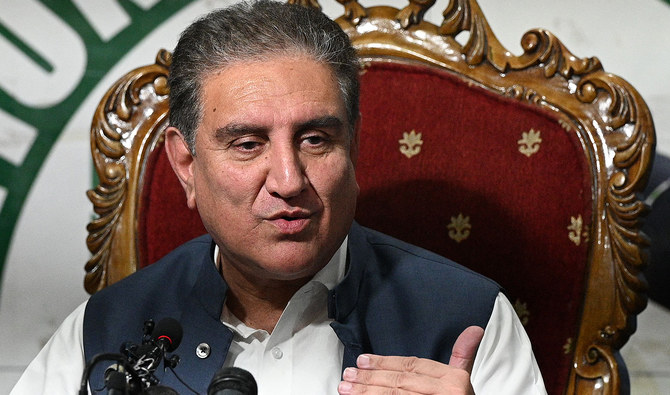ISLAMABAD: Pakistan’s Federal Investigation Agency (FIA) registered a case against former prime minister Imran Khan and ex-foreign minister Shah Mahmood Qureshi under the Official Secrets Act, 1923, after arresting the latter from his residence in the federal capital on Saturday.
The development came after the agency started probing the use of a diplomatic cable, called cipher, by the two officials since they mentioned it at a public rally ahead of a no-trust vote to establish that an international conspiracy had been hatched to bring down their administration.
The secret document was prepared by Pakistan’s envoy to Washington after his meeting with a senior American official who purportedly threatened the country of diplomatic trouble, if the ex-premier dodged the no-confidence vote and continued to stay in the office.
Khan waved the document at a public rally last year in March and later relieved bits and pieces of its information for public consumption.
A complaint lodged against the former prime minister and Qureshi said they were “involved in the communication of information contained in [the] secret classified document … to unauthorized persons (ie public at large).”
It noted that Khan and his associates held a “clandestine meeting” at his private residence in Islamabad to determine how to misuse the diplomatic cable “by twisting the facts” to suit their political objectives.
It added “the numbered and accountable copy of Cypher telegram sent to the PM Office was deliberately kept in his custody by the former Prime Minister Imran Khan, with malafide intention, and was never returned to the Ministry of Foreign Affairs.”
The complaint registered by the FIA maintained the diplomatic cable was still in Khan’s illegal possession, constituting a breach of the Official Secrets Act.
“The unauthorized retention and misuse of the Cypher Telegram by the accused persons compromised the entire cypher security system of the state and secret communication method of Pakistani missions abroad,” it added. “The actions by the accused persons directly / indirectly benefited the interest of foreign powers and caused loss to the State of Pakistan.”
It informed that a case had been filed against Khan and Qureshi for wrongful communication and use of secret official information and illegal retention of the cipher.
The FIA said that the role of other associates of Khan, including his principal secretary Azam Khan and former federal minister Asad Umar, would be ascertained while investigating the misuse of the diplomatic cable.
Earlier, Qureshi was arrested from his residence in the federal capital after holding a news conference in which he said that his party members were facing harassment from the state.
He told the media at the National Press Club that leaders of Khan’s Pakistan Tehreek-e-Insaf (PTI) party and their families had been targeted by various law enforcement agencies that were raiding their houses and shutting down their businesses and factories.
His party announced on social media that Qureshi was taken away by a heavy police contingent, though the charges against him were not clear.
Pakistan’s caretaker interior minister Sarfaraz Bugti confirmed, however, that the former foreign minister and PTI vice chairman was taken into custody since he was a person of interest in the ongoing cipher probe.
“He will soon be presented in the court,” he said during an interview with Geo News TV.
It is pertinent to mention that an American news organization, The Intercept, published what it said was a copy of the controversial cipher only a few days after Khan was arrested and sent to a Pakistani prison after a local court gave him three-year sentence in a case involving illegal sale of state gifts during his term in the office.
The former prime minister denies all charges against him and says he is not guilty of any wrongdoing.












